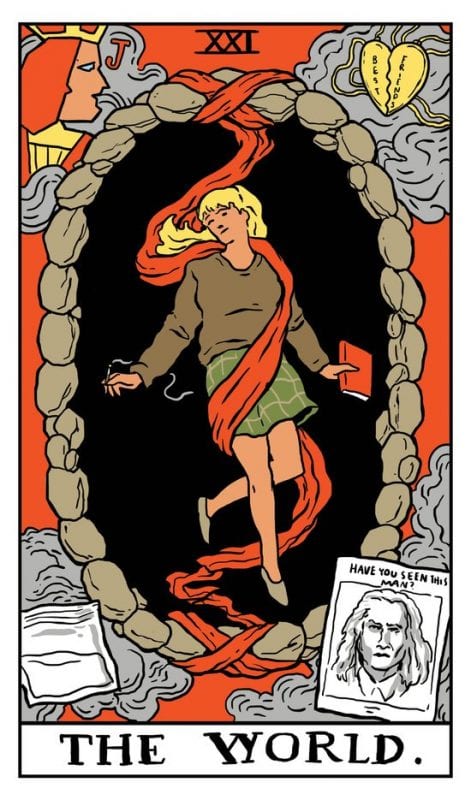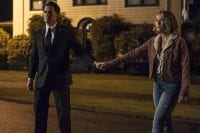For our final roundtable, the four editors of 25YL Site—John Bernardy, Eileen G. Mykkels, Andrew Grevas, and I—sat down to hash out the character arcs, the success and failures (as we saw them) related to our faves. You’ll be shocked to learn that we solved very little, but we had a lot of fun trying…and we hope you have fun reading.
Lindsay: Okay! First question, right off the top: Which character/character arc was your favourite? And which one was most surprising?
Eileen: Audrey’s surprised me completely, and I think the relative possible importance of it is also surprising. I’m not sure if it’s a favourite. I think that Ben’s or the Mitchum Brothers lay claim to favourite arc. (edited)
Andrew: My favorite is going to sound cliche but it’s Cooper. Most surprising is a harder question for me to answer. I’ll say Dr. Jacoby but that is subject to change.
Eileen: And what about you, Lindsay?
Lindsay: I didn’t expect to have to answer this lol…well…I think I really did love the many faces of Cooper, especially Dougie. I loved the simple way he worked through that life, and for it to be contrasted with Mr C’s evil felt very important and “right” too. Most surprising would have to be Audrey’s. I went in with zero true expectations for her role, but she ended up playing a very critical role, I think, so that was a nice surprise. Andy and Lucy too were lovely little surprises. Same with Bobby.
Eileen: Yes, Bobby’s was lovely.
Andrew: Absolutely agree. As I wrote two weeks ago in my column, I think the argument could be made that Audrey was a Top 5 most important role, all with perhaps 10 minutes of screen time.
Eileen: Shall we talk about her for a bit then, since we have consensus?
Andrew: I’m game.
Eileen: I’m in agreement, I believe, with others when I say that her 10 minutes of screen time are a template for understanding Cooper’s arc. How do you feel about that?
Lindsay: I’ve said that since the moment she “woke up” in Part 16, so yes, 1000%, I’m in agreement with you, Eileen.
Andrew: I see that point but it’s not my viewpoint. I’m more inclined to believe that Audrey is a symbol of the town of Twin Peaks, it’s trauma and potential recovery.
Eileen: I like that as well. She’s a very unlimited character in terms of meaning, considering her relative disassociation with the rest of the plot, despite how important she ended up being to it.
Lindsay: In my chat with Joel Bocko, he (correctly, in my opinion) pointed out that Audrey has always been somewhat off-set from the story and the rest of the characters, even as far back as Season 1…she was tangential, not central. So to have her character literally isolated from virtually everything else with the exception of the Roadhouse seemed very fitting
Eileen: Yes. Her only real connections are Ben and Cooper.
Lindsay: That’s in the original series, right?
John: She’s not even connected to Ben [in The Return]. He literally says nothing about her. Doc Hayward and Richard Horne are the only folks in the main reality who mention her by name. Frank Truman and DoppelCooper are the only witnesses in those scenes. No one else seems to mention her at all. It really is like Joel’s said where Audrey’s always been supernatural-adjacent up ’til now. It is fitting that she’s story adjacent this time around but still doesn’t make sense from a character standpoint to use her as they did.
Lindsay: I’ve kind of made my peace here with the idea that characters were less important than the bigger picture stuff, on the level of plot and theme. So I’m fine with Audrey’s character not making sense, because I see her arc functioning very importantly, possibly even metafictionally, and that’s more intriguing to me. But, I want to talk about both of your approaches here—Eileen, first, let’s talk about how you see Audrey fitting into the plot, and then we can talk about how she represents trauma and recovery to cover Andrew’s idea.
Eileen: Well, I suppose that most of us have wondered, if Audrey is in a lodge space, and due to the strangeness of her plot and dialogue, whether she might be in her own loop, altering little things each time to break the cycle. And if that’s the case for her, might it also be the case for Dale. All purely conjecture of course.
Lindsay: It is an idea that I have been pondering. Audrey seems to be going through the same conflict in each of her three scenes prior to arriving at the Roadhouse, but with slight variations. She’s sad, she’s scared, she’s indignant, she’s haughty, she’s angry…and finally, after attacking Charlie in the last house scene, she is able to arrive at the Roadhouse. It does seem as though this is important. So if that’s true, it could hold for Cooper as well.
John: I’ve been preaching this one since my first column…Audrey’s the answer key for Cooper and Laura’s situation, and her situation leads to at least four different equally-reasonable explanations.
Lindsay: I think we’re on the same page, John. I like that.
Eileen: Either way we look at it, she provides a template. If it’s for the whole town, how do you suggest it works, Andrew?
Andrew: Audrey’s narrative, like many other characters’, began a downward spiral after Laura’s death. While I do agree that she was always somewhat removed from the other characters, she was running parallel. While we have to wait for the Final Dossier to get exact dates and times, we do know that the town of Twin Peaks has unraveled over time. It’s unhinged. There are cycles repeating, there’s resistance to these changes and there’s outside influences that took away that sleepy 1950’s vibe we all talked about so much in the original series. Audrey in her scenes, showed repeating behavior, had an outside influence (Charlie) that was impacting her negatively and she was resisting, yet stuck.
John: I dig this.
Eileen: But because she has the ability to wake herself up, that means there’s hope for Cooper and by extension the entire Town of Twin Peaks?
Andrew: I believe so. I actually expected that to happen in the finale but I think it’s safe to say all of expectations were blown out of the water on those final hours.
Eileen: Definitely. So, in this sense, Jacoby’s motto is a motto for everyone in Twin Peaks, I guess?
Andrew: Absolutely. As you can tell, I’m very much hung up on what I refer to as the social commentary aspect of the show.
John: Jacoby’s also a big part of the answer key, with the motto of the whole series: if you can’t overcome your grief and come to terms with your trauma you’re stuck in it (and “it” can easily manifest in a time loop).
Lindsay: I think that’s the best interpretation of “dig yourself out of the shit”—truly. It’s not just a gimmicky sales pitch, though it functions that way on the surface and is played for fun. In the end, it’s the biggest theme of The Return in my opinion. I love that. Let’s come back to that!
Eileen: People have been asking why Lynch and Frost felt the need to return to Twin Peaks, and I think that the social commentary is absolutely why. I love that the template for this understanding gets to be Audrey. She’s such a fascinating character.
Andrew: My final point on Audrey is that there were arguably 3 faces of Twin Peaks: Cooper, Laura and Audrey. I find it absolutely fitting for Audrey to be the character whose story parallels the town’s narrative.
Lindsay: Ooh, I like that, Andrew. Many may not, I think, because for some reason hating on Audrey is in vogue among some segments of the fan population. But I think you could be right that she is more important than we may have ever given her credit for
Andrew: The Return is something to be studied slowly and little bits at a time. In my personal exploration, I chose Audrey and what does an 18-hour film really mean to be my starting points. I’m convinced that Audrey is vital. The next part of my exploration is the idea that Lynch and Frost are telling the story of their generation in The Return. How they’ve seen the world change and they’re telling that story through the lens of Twin Peaks.
Lindsay: Okay, so, Jacoby’s motto…now that’s an interesting little piece of this puzzle. The people who do shovel themselves out of their own shit—Nadine, Ed and Norma, Bobby (to an extent, possibly) and Audrey (maybe?)—have at least not-negative outcomes, arguably. The characters who aren’t able to shovel themselves out or rely on others to do the shoveling—and we may have to include Cooper in that—aren’t as lucky.
Eileen: Definitely. To an extent. I think this only applies to characters in Twin Peaks, or the Las Vegas stuff doesn’t really fit.
Lindsay: I’m not a huge fan of the implications that one must only ever solve their own problems on their own without help (feels antithetical to a broader social contract that I, as a socialist, free healthcare-having, high tax-paying Canadian, hold very near and dear to my heart.) But yes, at least insofar as Twin Peaks is concerned, it does seem to hold that there’s more personal responsibility at stake for one’s circumstances
John: Exactly, and there’s that old adage where you can’t help people who can’t help themselves. It starts inside, with the acceptance that you need to be a part of your own saving (which is why I posit Laura’s still stuck in her time loop because an FBI agent and angels are the ones officially on record pulling her from her mess. Still working this out but I’m trying to explain how Laura hasn’t been cruelly re-victimized, rather still in-process).
Lindsay: That’s an interesting idea, John. Can’t wait to see what you come up with…and to argue against it! Haha…
Eileen: I think Mat’s article fits with this idea—it isn’t so much that you can’t accept other people’s help, more that, I think, some things need to be worked through privately, or you’ll never really get over it.
Lindsay: So, Andrew, you see Laura and Cooper as having a similar function to Audrey in the sense that they parallel what’s happening Twin Peaks?
Andrew: I do not. I think the 3 “faces” or “franchise players” each have independent arcs that are all important.
Lindsay: Ah, okay! It’s tricky with Cooper and Laura, and possibly even with Audrey, in the sense that we aren’t really sure who they are at the end of the day. That ending really threw us all for a loop…so many people are so upset that the preceding 16 and a half hours, and possibly the original series and Fire Walk With Me, have been cancelled in some way by the ending
Eileen: Nothing is cancelled in my opinion.
Andrew: I agree. I don’t think anything changed.
John: Agree. Nothing has been invalidated.
Lindsay: I’m with you guys. But the fan reaction has been incredibly vitriolic in places. I’m tempted to suggest that it’s because we’ve spent so many hours with Cooper and Laura and the cast of characters in Twin Peaks—it’s by far Lynch’s longest project in terms of material—and to reach the end where there’s this twist and the suggestion that all that we’ve come to accept about this world may not be as it seems is too much to bear for some. But it is very in keeping with Lynch’s ethos. Cooper as we know him and Richard-Cooper can both exist at the same time, in the same space, even. So can Laura Palmer and Carrie Page. It’s not either/or, it’s both/and.
Andrew: Fan expectations were high. People wanted closure. I understand the human need for closure but that’s just not how Lynch and Frost operate. We were left with mystery. The world of Twin Peaks continues on in our mind for as long as we allow it to. Personally, I love that.
John: Fans are reacting to a bit of a bait-and-switch I think, where we thought it was about Cooper getting out of the Lodge but we figure out really late in the game that this was only a major step in Cooper’s real plan. There’s a sense of betrayal and acclimation to accepting the story we thought we were being told versus the one we really got.
Lindsay: So since you brought up mystery, let’s chat about one of the biggest mysteries in The Return: what do you think was really going on with Sarah Palmer??
Andrew: I think we were being shown Sarah’s pain and suffering all season long. The Lodge wanted her and they finally got her. I would even go as far as to say that the Palmer house was the prize possession. What house was more full of pain and suffering than that one? My interpretation is that the Palmer tragedy was completed and now the Lodge dwellers have a home in Twin Peaks.
Lindsay: Yes, I tend to agree with you. I have this very awful feeling that “home”, personified as the Palmer house literally and Twin Peaks metaphorically, is not a place we should want to return to at all precisely because it’s the seat of some truly evil stuff now. I think it’s a bit of a cop-out to suggest that Sarah = Judy, on any kind of literal inhabitation/possession level, because that’s too neat and tidy an explanation for Sarah’s behaviour. So I think you’re right, Andrew, that her grief and pain and suffering is what caused her darkness, and the Lodge is feeding on that. But it’s the house itself that is the conduit (as Ali and others have suggested). It’s like the Poltergeist house
Andrew: Agreed.
Lindsay: So, that being said…we have some interesting stuff being set up with Cooper/Richard and Laura/Carrie at the very end. A lot heavily depends on how we read those characters and where they are in their arcs at the end of the story. Is Carrie *actually* Laura in disguise, or Laura after repressing the memories of her past? If part of Laura is in Carrie, how can we absolve Cooper of the damage he’s done by bringing her to this place of such suffering? If she *isn’t* Laura, and Cooper is *wrong*, what does *that* say about him? Basically, the complexity of each of their characters at the end is absolutely fascinating to me, and I want to hear your take on what you think is going on there.
Andrew: My previous answers about Audrey and Twin Peaks itself were very Mark Frost inspired. Here we’re moving into the Lynch realm of things. It’s almost as if they allowed each other to take aspects of the story that meant the most to them. I very much see Cooper’s journey throughout all 18 hours as a spiritual one. He was a man robbed of 25 years of his life. He belongs nowhere now in a sense. Being Dougie allowed him to experience some of the things his life deprived him of and left him in a state of limbo. He was our Dale but with limited tools and resources. His personal compass—particularly in the spiritual realms—always leads to Laura. I think we saw him on an auto pilot of sorts in his quest to find her. What happened was that he went to a place he had never been and only had Laura to rely on. I believe Part 8 showed us that Laura exited again, elsewhere. A Tulpa perhaps? Could Diane’s Tulpa gaining memories in Part 16 be used as a template for Laura. I’m still working out a lot of my theories on these characters but right now the one thing I come back to is that they had to find each other so they could remember. By no means do I think Cooper should take any blame for plucking Carrie Page from Texas. Her existence there looked just as painful, albeit in different ways perhaps as Laura Palmer.
Lindsay: There is a sense that Carrie—whether she’s truly Laura or not—is shaded by Laura in many ways. They do seem to be living the same life, though Carrie seems to have shoveled herself a little bit out of the shit if she killed the guy on the couch. So there’s that. I know that both you, Andrew, and John are much more…hmm…shall I say “protective” of Cooper than either Eileen and I are…
Andrew: I wouldn’t say protective over the character, just a different reading of him.
Lindsay: Haha, okay…maybe it’s just John who is protective…
John: Not overly protective of Cooper here. I think he’s overstepped.
Lindsay: Way to go and make me look like I don’t know what the hell I’m talking about, fellas! Mea culpa…but okay, so we have no problem admitting that I think it was perhaps indicative of a failing on Cooper’s part to believe that bringing Carrie/Laura “home” would be a good thing. But then again, I am reading the ending as a failure; you could read it as a resounding success, with Carrie/Laura destroying the evil that resided in her home once and for all. It’s a perfectly valid response to the finale.
Andrew: I’m in the middle. I don’t think it was a failure or success—yet. I think Cooper and Laura or Richard and Carrie were doing exactly what they were supposed to do. The wheels were set in motion for this part of their journey by The Fireman.
Lindsay: Yes, I see your point. It’s certainly a very valid reading of The Fireman and his role, which is—again—ambiguous as all get out. Whether you read it as clues or a warning, The Fireman turned out to be massively important and that was another lovely surprise, to jump back up to my initial question.
Eileen: I have never considered the Fireman’s statements to Cooper to be clues, but rather warnings. It’s never explicitly stated.
Andrew: Agreed. Richard and Carrie MAY be pawns. I won’t go that far yet but I do think they are serving a purpose setup by The Fireman. I personally see a lot of Lynch’s spiritual beliefs in the arcs of Dale and Laura.
Lindsay: Oh yes, absolutely! I think this is where it becomes vital that we at least try to understand what Lynch is doing with his late-stage films. The original Twin Peaks was made during his first-stage career and operates under some different guiding principles, although the seeds are all there for what Lynch did with his later work. By the time we reach Inland Empire and now with The Return, this idea of shifting identities and cyclical journeys and veils between worlds are fairly well established. Add to that what seems to be happening with both Cooper and Laura and I think it’s very clear what he’s showing us about the nature of these two characters…
Andrew: Agreed and the only thing I would add is that he’s showing how much these characters mean to him. It’s very personal work.
Lindsay: Yes, absolutely.
Eileen: I definitely think that this season wasn’t a story. It isn’t about the people, it isn’t about the surface of what happens, it’s about a larger conscious understanding of the thematic elements that drove Lynch and Frost to writing and creating it.
Lindsay: I agree. It’s taken on truly vast and almost cosmic significance now. It’s why I have no problem looking at this as a “magnum opus” of sorts. It’s a truly remarkable piece of art.
Andrew: That’s where I think The Fireman comes into play. He’s almost there to make sure that good and evil balance each other out, which I believe was his intention with Cooper and Laura ( or Richard and Carrie)
Eileen: Both of whom seem to be an interesting mix of good and bad
Lindsay: Yes, a balancing force. Neutralizing things, keeping the scales in order.
Andrew: Exactly. Which again plays into Lynch’s spirituality. And now we’re touching on the source of my frustration when people ask why they came back or what was the point.
Eileen: Because they don’t necessarily want to look at it this way. It’s the same with a lot of thing, especially film and television, that ask more of their audience than just to sit back and enjoy. Even for Twin Peaks viewers and Lynch fans, I can understand that it gets difficult. It’s all about inner harmonics. Twin Peaks is its own ‘body’ of sorts. As is the world. And it requires that there be harmony within.

Lindsay: And who better to represent the body of Twin Peaks than Laura Palmer?
Eileen: Ironically enough, Laura is the World Card in the Twin Peaks tarot. The World Card is Completion, and integration.
Lindsay: That is incredible! And yes, very telling indeed…
Eileen: So, the final message, above all of the sub-messages about trauma and not being able to go back, and shovelling oneself out of the shit are all comprised under the heading, the final message of “We are all a part of this world and we all rise or fall with each other?”
Lindsay: I can’t think of a better place to end this…honestly. Laura is The One.




